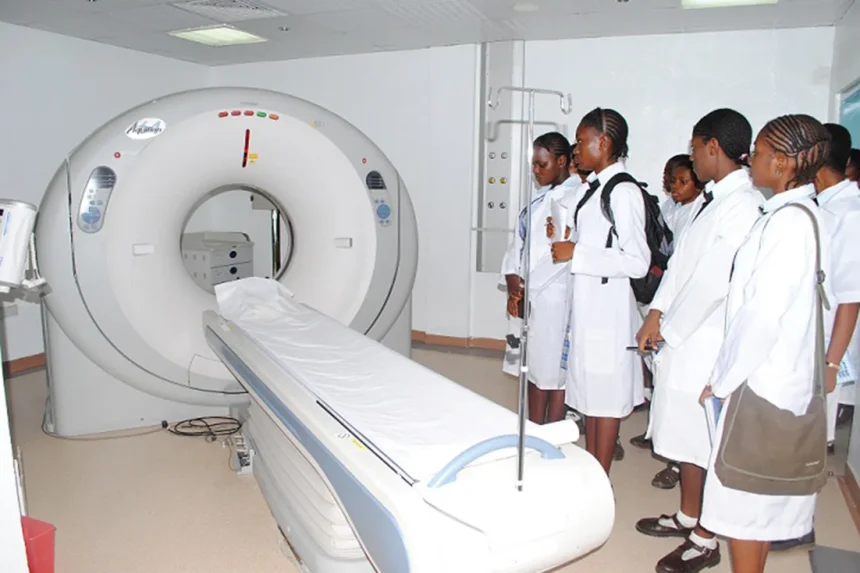Radiology is a crucial field in modern medicine that involves using imaging techniques to diagnose and treat diseases. In Nigeria, becoming a radiologist requires specific educational and training steps. This guide will walk you through the entire process, from secondary school to becoming a licensed radiologist.
Step 1: Excel in Secondary School
Your journey starts with a solid foundation in secondary school. You need to excel in your West African Senior School Certificate Examination (WASSCE) or its equivalent, especially in science-based subjects:
- Biology
- Physics
- Chemistry
- Mathematics
- English Language
Performing well in these subjects is essential for gaining admission into a radiography program at a Nigerian university.
Step 2: Prepare and Ace the UTME
Next, you’ll need to sit for the Unified Tertiary Matriculation Examination (UTME), focusing on the following subjects:
- English Language
- Biology
- Chemistry
- Physics
A high UTME score is essential because radiography programs are competitive. Ensure you surpass the required cut-off mark for your desired institution to improve your admission chances.
Step 3: Earn a Bachelor of Radiography
Once admitted, you will pursue a Bachelor of Radiography degree. This is a 5-year program (4 years for direct entry) offered at several universities in Nigeria. The program includes both theoretical and practical courses focused on medical imaging technologies such as:
- X-ray
- Computed Tomography (CT)
- Magnetic Resonance Imaging (MRI)
- Ultrasound
During these five years, you will undergo rigorous training to prepare you for a career in medical imaging.
Nigerian Universities Offering Bachelor of Radiography:
- University of Calabar
- University of Lagos
- University of Nigeria, Nsukka (UNN)
- Bayero University, Kano
- Nnamdi Azikiwe University, Awka
Step 4: Complete a One-Year Internship
After graduating with your Bachelor of Radiography, you are required to complete a one-year internship at an accredited hospital. This practical experience is critical for:
- Applying theoretical knowledge to real-world scenarios
- Refining your technical skills in medical imaging
- Gaining hands-on experience in a clinical environment
Step 5: Serve in the National Youth Service Corps (NYSC)
Like other Nigerian graduates, you will be required to participate in the National Youth Service Corps (NYSC) for one year. During this time, you can work in hospitals or radiography departments across the country, expanding your experience and networking with professionals in the medical field.
Step 6: Obtain Your License to Practice
After completing your internship and NYSC, you must obtain a practicing license from the Radiographers Registration Board of Nigeria (RRBN). This license is mandatory for anyone who wishes to work as a radiographer in Nigeria. Make sure you meet all the requirements to register with RRBN.
Step 7: Apply for Residency Training in Radiology
Once licensed, you can further your career by applying for a residency program in Radiology. This program, which usually takes 5-6 years, is available at accredited teaching hospitals. During this period, you will undergo advanced training in medical imaging techniques, including:
- Diagnostic Radiology
- Interventional Radiology
- Radiation Therapy
Step 8: Pass the Fellowship Examination
After completing your residency, you will need to sit for the Fellowship Examination offered by either:
- The National Postgraduate Medical College of Nigeria (NPMCN), or
- The West African College of Surgeons (WACS) in Radiology
Passing this exam certifies you as a specialist radiologist, enabling you to practice as a consultant in radiology.
Step 9: Pursue Subspecialty Training (Optional)
If you wish to specialize further, you can undergo fellowship training in a particular area of radiology, such as:
- Interventional Radiology
- Pediatric Radiology
- Neuroradiology
- Musculoskeletal Radiology
This additional training allows you to develop expertise in a focused area of radiology.
Step 10: Commit to Lifelong Learning
The field of radiology evolves rapidly, with advancements in technology and techniques. To remain relevant and at the top of your field, you must commit to continuing education by:
- Attending conferences and seminars
- Participating in professional development programs
- Staying updated on the latest research and innovations in radiology
Frequently Asked Questions on How to Become a Radiologist in Nigeria
How long does it take to become a radiologist in Nigeria?
What is the difference between radiology and radiography?
Which universities in Nigeria offer a Bachelor of Radiography?
What subjects do I need to focus on in secondary school to study radiography?
Is an MBBS degree required to become a radiologist in Nigeria?
What is the role of the Radiographers Registration Board of Nigeria (RRBN)?
Can I specialize in a specific area of radiology after becoming a radiologist?
Didn't find what you were looking for? Search here


